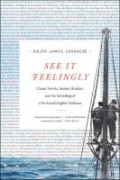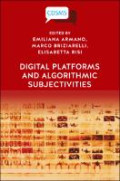
AI for Everyone?
We are entering a new era of technological determinism and solutionism in which governments and business actors are seeking data-driven change, assuming that Artificial Intelligence is now inevitab…
- Edisi
- -
- ISBN/ISSN
- 9781914386169
- Deskripsi Fisik
- ebook
- Judul Seri
- -
- No. Panggil
- -

AI Art
Can computers be creative? Is algorithmic art just a form of Candy Crush? Cutting through the smoke and mirrors surrounding computation, robotics and artificial intelligence, Joanna Zylinska argues…
- Edisi
- -
- ISBN/ISSN
- 9781785420863
- Deskripsi Fisik
- ebook
- Judul Seri
- -
- No. Panggil
- -

How Computers Entered the Classroom, 1960–2000
In the history of education, the question of how computers were introduced into European classrooms has so far been largely neglected. This edited volume strives to address this gap. The contributi…
- Edisi
- -
- ISBN/ISSN
- 9783110780147
- Deskripsi Fisik
- ebook
- Judul Seri
- -
- No. Panggil
- -

See It Feelingly
Ralph James Savarese showcases the voices of autistic readers by sharing their unique insights into literature and their sensory experiences of the world, thereby challenging common claims that peo…
- Edisi
- -
- ISBN/ISSN
- 9781478093473
- Deskripsi Fisik
- ebook
- Judul Seri
- Thought in the Act,
- No. Panggil
- -

Error-Correction Coding and Decoding
Coding; Communications; Engineering; Networks; Information Theory; Algorithms
- Edisi
- -
- ISBN/ISSN
- 9783319511023
- Deskripsi Fisik
- ebook
- Judul Seri
- Signals and Communication Technology,
- No. Panggil
- -

Digital Platforms and Algorithmic Subjectivities
Algorithms are a form of productive power – so how may we conceptualise the newly merged terrains of social life, economy and self in a world of digital platforms? How do multiple self-quantifyin…
- Edisi
- -
- ISBN/ISSN
- 9781914386121
- Deskripsi Fisik
- ebook
- Judul Seri
- -
- No. Panggil
- -

Rhetorical Code Studies: Discovering Arguments in and around Code
Winner of the 2017 Sweetland Digital Rhetoric Collaborative Book Prize Software developers work rhetorically to make meaning through the code they write. In some ways, writing code is like any othe…
- Edisi
- -
- ISBN/ISSN
- 9780472131273
- Deskripsi Fisik
- ebook
- Judul Seri
- Sweetland Digital Rhetoric Collaborativ
- No. Panggil
- -

Chapter Reading to reveal the world
Following the critical principles as they were articulated in an earlier article on South African literature (Buikema, 2009), the paper discusses a more recent call for literary engagement in the c…
- Edisi
- -
- ISBN/ISSN
- 9789048560110
- Deskripsi Fisik
- ebook
- Judul Seri
- -
- No. Panggil
- -

Causal Mechanisms in the Global Development of Social Policies
This open access edited volume introduces the concept of causal mechanisms to explore new ways of explaining the global dynamics of social policy, and shows that a mechanism-based approach provides…
- Edisi
- -
- ISBN/ISSN
- 9783030910884
- Deskripsi Fisik
- ebook
- Judul Seri
- Global Dynamics of Social Policy
- No. Panggil
- -

Evidential Pluralism in the Social Sciences
This volume contends that Evidential Pluralism—an account of the epistemology of causation, which maintains that in order to establish a causal claim one needs to establish the existence of a cor…
- Edisi
- -
- ISBN/ISSN
- 9780367697228
- Deskripsi Fisik
- ebook
- Judul Seri
- Philosophy and Method in the Social Sciences
- No. Panggil
- -

 Karya Umum
Karya Umum  Filsafat
Filsafat  Agama
Agama  Ilmu-ilmu Sosial
Ilmu-ilmu Sosial  Bahasa
Bahasa  Ilmu-ilmu Murni
Ilmu-ilmu Murni  Ilmu-ilmu Terapan
Ilmu-ilmu Terapan  Kesenian, Hiburan, dan Olahraga
Kesenian, Hiburan, dan Olahraga  Kesusastraan
Kesusastraan  Geografi dan Sejarah
Geografi dan Sejarah